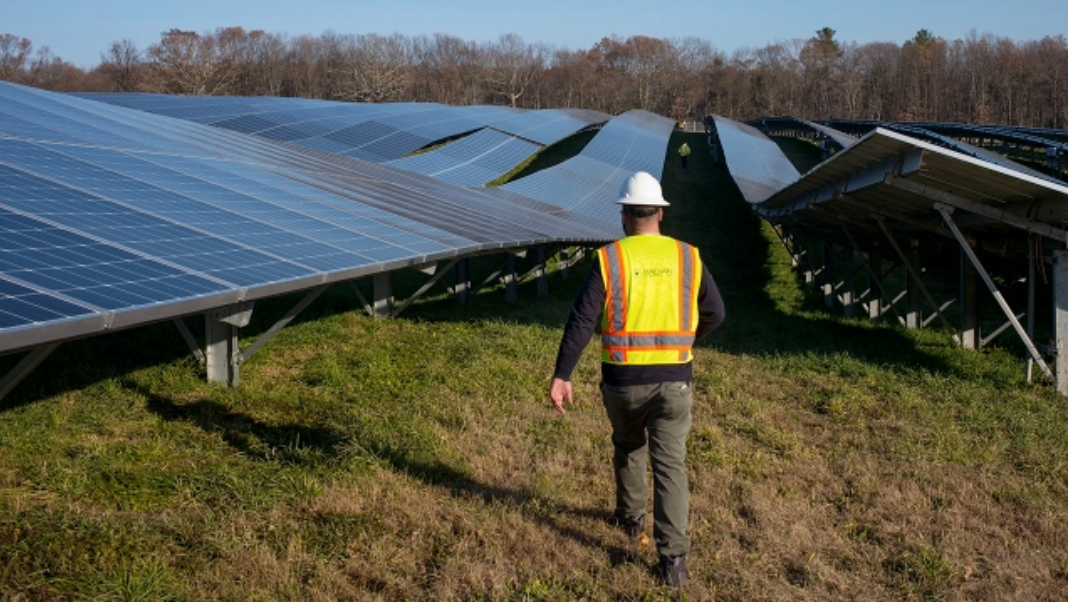Policymakers must decide if it’s worth holding on any longer to an aging oil and gas industry that’s losing jobs and harming the environment or if they should go with fast-growing and safer clean energy future.
A family-owned solar power farm located in Grafton, Massachusetts, that gives electricity to local homes and businesses (Robert Nickelsberg/Getty Images).
Although fossil fuels still account for 80 percent of the United States’ total energy supply, the future of this energy source is still highly debated, especially since it accounts for almost 15 percent of the world’s carbon emissions. For the sake of the planet, the US will need to switch to an economy that runs completely on clean, non-polluting energy. The big question is: how exactly do we get there?
Because they are made from toxic pollutants, fossil fuels are a major contributor to the devastating consequences of climate change, which has led to drastic and dangerous disruptions in the Earth’s environment. Accelerating that process, as well, is methane, which comes not only from fossil fuel sources, but from – surprisingly – agricultural livestock, too. Because of this, there is an increase in natural disasters that are not just destroying shorelines, but are destroying whole forests, making places more unlivable and resulting in dangerous decreases in air quality. That also leads to a tremendous strain on world economies and the widening of inequality.
Although nearly 80 percent of Americans say it’s important for the United States to transition to renewable energy sources (i.e. solar, wind, geothermal, hydro, etc.), there is still a considerable amount of resistance regarding the transition from fossil fuels into clean or renewable energy. This is due to the politically driven narrative that’s crafted predominantly by fossil fuel industry lobbyists and advocates, allied with Republican party operatives, politicians, and their supporting network of conservatives: for example, look at the pervasive spread of disinformation ads on Facebook during the recent COP26 climate conference. This message pushes the misleading claim that switching to a clean energy economy will not only hurt American workers but also wreck the economy.
These drive the notion that clean energy is more expensive, and that the elimination of the industry would cause mass unemployment. It’s an argument that has, unfortunately, been successful enough to make some Americans unreasonably hesitant about immediately and quickly switching to clean energy as the planet undergoes dangerously climatic changes caused by fossil fuel pollution.
Fossil fuels, however, are actually counterproductive economically. As the Center for American Progress reports, transitioning to clean energy would actually save households $500 per year in energy costs; in fact, it’s fossil fuels that are driving up the costs of goods and services and are responsible for the increases in inflation we’re seeing. Additionally, the fossil fuel sector is environmentally insensitive, especially since fossil fuels are unsustainable and non-renewable energy cannot sustain itself once all the fuel is used up.
With a new administration, it seems as if one of the nation’s top properties will be combating climate change and toxic pollutants. In fact, President Biden not only canceled the controversial Keystone XL pipeline, a project that would have transported carbon-heavy oil from Canada to the Gulf Coast, but he has reversed most Trump administration policies that were not friendly to the environment. He’s also passed a major $1.2 trillion Infrastructure Act which contained billions in climate response investments, while also announcing an unprecedented agreement with China to collaborate on climate response. The United States also rejoins the Paris Climate Accord, the global treaty to reduce and, ultimately, eliminate dangerous carbon emissions.
As this occurred, a few Congressional policymakers have already lashed out and made it a priority to undermine the president’s environmental agenda. The basis and core argument of political opposition to a full clean energy transition is the misrepresentation that it kills jobs. The “clean-energy-destroys-jobs” argument is very powerful and, on some levels, popular in the immediate term – this argument, however, is based solely on speculation and lacks little factual support. The transition into a new energy source would actually benefit the country’s economy, not the other way around. Not only is an increasing number of jobs lost when sticking with a predominately fossil fuel economy, but, in contrast, there is evidence supporting the idea that a significant number of jobs will be gained through the transition into a clean energy economy.
The key in countering a very loaded and politically effective “pro-jobs” campaign against clean energy transition is to clearly show the jobs and economic benefit from full clean energy. Research shows that fossil fuel employment is shrinking, and has been shrinking for some time. For example, from 1980 to 2015, coal mining lost more than 58 percent of its jobs. This is not due to regulation, but mechanization and, in some sectors, decreased demand. In 1980, producing 100 tons of coal per hour required 52 miners. As of 2015, this number had dropped to 16 miners, and this is the case even though there is more coal being mined now. During the pandemic, the coal mining industry continues to suffer even more losses. In contrast, renewable energy creates more well-paid jobs per dollar spent and, as new technologies mature, will continue to do so. Not only is clean energy cheaper, but it also provides more jobs – and similar pay – for the same amount of electricity.
By the end of 2019, 3.4 new million jobs were created in the renewable energy and energy efficiency research field, which is more than half of the jobs currently in fossil fuel energy. Prior to the pandemic, clean energy was one of the country’s strongest sectors, adding jobs at a rate 70 percent faster than the overall economy. As policymakers increase efforts to combat the climate crisis and cut greenhouse gas emission, jobs in the sector will most likely expand exponentially.
“In terms of climate crisis, the window is closing: we really just have the next decade to go carbon negative and come up with a bold offset plan or we will reach a point of disastrous no return,” said Charles Ellison, Senior Fellow at the Council of State Governments Eastern Regional Conference. “This will require a gargantuan collaborative effort on the part of policymakers on the local, state and federal level. Municipalities could be instrumental in encouraging more residential and individual level action, while states can really take a lead in passing carbon reduction and clean energy policies and targets as the federal government can set the overall national tone.”
Furthermore, a vast majority of traditional energy sector jobs – including electricians, power plant operators, and oil platform rigger – are needed for both fossil fuel and non-fuel energy industries. Therefore, any further transition for the future of energy technology will not displace workers and will not be as complicated and as disastrous as critics are implying. “There is this incorrect assumption that transitioning to clean energy means a sudden loss in fossil fuel sector jobs that will never come back. That’s false,” argues Ellison. “What we’re finding is that the fossil fuel sector by all accounts is actually experiencing a decline in demand, energy marketplace share, and jobs. We’re missing out on a rather significant increase in job opportunities by refusing to expand or invest in clean energy. So, the benefits are enormous and, potentially, four-fold: we save the planet and our habitats, we actually expand our economies, then we create more jobs and we improve public health. That’s a huge return on investment.” Additionally, the clean energy sector does not only include jobs in renewable energy, but also in energy efficiency, electric and hybrid cars.
A clean economy is essential. However, a main concern is whether fossil fuel workers, and communities that depend on them, will be left behind during this transition. In an economic transition, policymakers will need to fully consider fossil fuel workers and their communities. The impact of potential losses to families, businesses, and counties relying heavily on fossil fuels must be taken into full account during this transition. Workers in the oil and gas industry who work in chemical manufacturing and rail shipping need supportive policies and programs as the economy shifts, especially since they have the expertise to build out the kind of infrastructure that supports clean energy. There are many assumptions that this transition from fossil fuels to clean energy is unrealistic. That is simply not the case. A majority of energy sector jobs, including electricians, power plant operators, riggers, are needed for both fossil fuel and non-fuel energy industries.
Clean energy, as a result of the pandemic, has been experiencing serious losses. However, that level of loss has been happening in every sector, including the fossil fuel industry. Additionally, due to the national government’s failure to generate as much revenue as it is spending during the pandemic, specifically, on relief funds, the clean energy sector is not receiving as much investment or financial support as needed.
The transition into a new major national energy industry will not be easy. However, continuing to use fossil fuels will be destructive to the environment and, ultimately, our ability to live on this planet. Needless to say, there are many logistics that go into a successful clean energy industry, but a transition is still a crucial, pressing demand. The world needs a new power source, and renewable energy will be essential in addressing the future of our environment and the security of future generations. Looking at the glass half empty, in this case, is not an option.
Photo credit: Robert Nickelsberg/Getty Images







